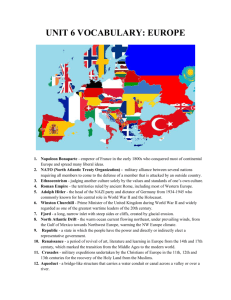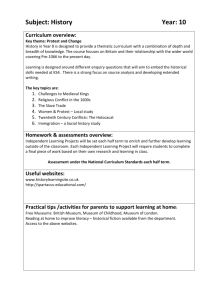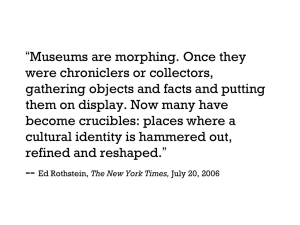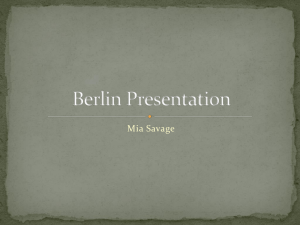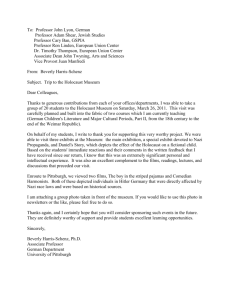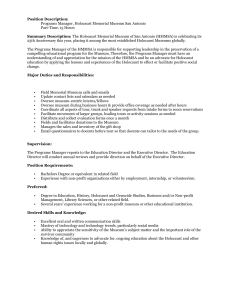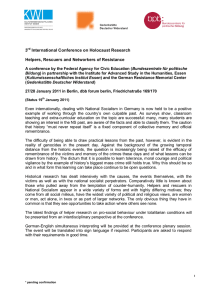Program “httpasts://digitalmemoryonthenet”
advertisement
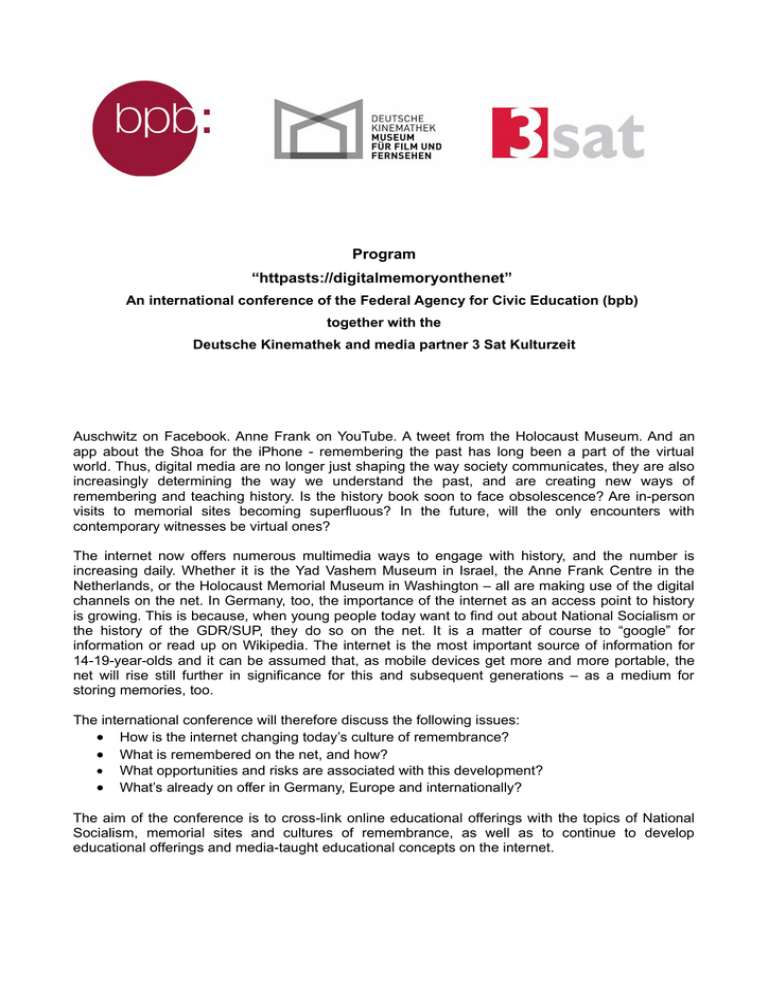
Program “httpasts://digitalmemoryonthenet” An international conference of the Federal Agency for Civic Education (bpb) together with the Deutsche Kinemathek and media partner 3 Sat Kulturzeit Auschwitz on Facebook. Anne Frank on YouTube. A tweet from the Holocaust Museum. And an app about the Shoa for the iPhone - remembering the past has long been a part of the virtual world. Thus, digital media are no longer just shaping the way society communicates, they are also increasingly determining the way we understand the past, and are creating new ways of remembering and teaching history. Is the history book soon to face obsolescence? Are in-person visits to memorial sites becoming superfluous? In the future, will the only encounters with contemporary witnesses be virtual ones? The internet now offers numerous multimedia ways to engage with history, and the number is increasing daily. Whether it is the Yad Vashem Museum in Israel, the Anne Frank Centre in the Netherlands, or the Holocaust Memorial Museum in Washington – all are making use of the digital channels on the net. In Germany, too, the importance of the internet as an access point to history is growing. This is because, when young people today want to find out about National Socialism or the history of the GDR/SUP, they do so on the net. It is a matter of course to “google” for information or read up on Wikipedia. The internet is the most important source of information for 14-19-year-olds and it can be assumed that, as mobile devices get more and more portable, the net will rise still further in significance for this and subsequent generations – as a medium for storing memories, too. The international conference will therefore discuss the following issues: • How is the internet changing today’s culture of remembrance? • What is remembered on the net, and how? • What opportunities and risks are associated with this development? • What’s already on offer in Germany, Europe and internationally? The aim of the conference is to cross-link online educational offerings with the topics of National Socialism, memorial sites and cultures of remembrance, as well as to continue to develop educational offerings and media-taught educational concepts on the internet. Thursday, 14 April 2011 (Current status: 17 March 2011) From 3:30 p.m. Registration 5:00 p.m. Welcome 5:30 p.m. – 6:15 p.m. Opening presentation: Virtual Remembrance? Global and European Perspectives Claus Leggewie, Institute for Advanced Study in the Humanities, Essen Moderation: Tina Mendelsohn, 3sat Kulturzeit 6:15 p.m. – 7:15 p.m. Followed by discussion with Claus Leggewie, Institute for Advanced Study in the Humanities, Essen, Sonja M. Schultz, film researcher Berlin, Stephan Humer, internet sociologist, University of arts, Berlin Moderation: Tina Mendelsohn, 3sat Kulturzeit Reception from 7:15 p.m. Friday, 15 April 2011 8:30 a.m. Welcome 8:45 a.m. – 10:15 a.m. Global remembrance culture on the net? – Websites and educational offerings internationally* Moderation: Keith Allen • • • Na'ama Shik , Yad Vashem, Jerusalem David Klevan, US Holocaust Memorial Museum, Washington Ita Amahorseija/Gerrit Netten, Anne Frank House, Amsterdam 10:15-10:25 a.m. Thomas Krüger, President of the Federal Agency for Civic. Education Thoughts on Remembrance Cultures Online as a Challenge for Civic Education 10:25-10:45 a.m. Break 10:45 a.m. – 12:00 Remembrance cultures online – Websites and educational offerings on the internet Dörte Hein, Media Authority of North Rhine-Westphalia, Düsseldorf and Erik Meyer, Justus Liebig University Gießen Moderation: Markus Heidmeier, Kooperative Berlin 12:15 – 1:30 p.m. Remembrance online - Opportunities and risks Followed by debate Michael Wildt, Humboldt University Berlin and Viktor Mayer-Schönberger, Oxford Internet Institute, Oxford University Moderation: Ralf Müller-Schmid, DRadio Wissen 1:30 p.m. – 3:00 p.m. Lunch 3:00 p.m. – 4:30 p.m. Voices from the net – the virtual contemporary witness Moderation: Bettina Alavi, Pedagogical University Heidelberg • Verena Nägel, Visual History Archive of Shoah Foundation at FU Berlin • Edward Serotta and Fabian Ruehle, Centropa, Jewish Witnesses of a European Century, Vienna • Ruth Oelze, video archive of the Memorial to the Murdered Jews of Europe, Berlin 4:30 p.m. – 5:00 p.m. Break 5:00 p.m. – 6:30 p.m. Remembrance and Social Networks* Moderation: Tina Mendelsohn, 3sat Kulturzeit • Ita Amahorseija, Anne Frank House, Amsterdam • Mirjam Wenzel, Jewish Museum Berlin • David Klevan, US Holocaust Memorial Museum, Washington • Na'ama Shik, Yad Vashem, Jerusalem Saturday, 16 April 2011 9:30 a.m. – 10:45 a.m. Digital Media and Media education Birgit Marzinka, Learning from History, Berlin and Benjamin Jörissen, Otto von Guericke University Magdeburg Moderation: Matthias Hass Parallel workshops 11:15 a.m. – 1:00 p.m. 1) “Money for Nothing? Clicks for Free” Keith Allen, Historian, Berlin David Klevan, US Holocaust Memorial Museum, Washington How can institutions, museums or memorial sites optimise their own website by simple and cost-effective means? And how can more visitors be drawn to the website? Keith Allen and David Klevan will provide practical tips and support during this workshop. 2) “Contemporary witnesses on the social Web” Benjamin Jörissen, Otto von Guericke University Magdeburg Articulating, presenting, networking: the social Web as a toolbox during historical research; provides a variety of tools that can be used free of charge and that are easy to apply when researching and teaching history. In this workshop it will be demonstrated how platforms for collaborative historical research can be set up using basic resources (for example, for co-operation with other classes, schools, institutions or archives) and what tools can be applied to use the Web as a publication platform (for example, to represent contemporary witness projects) and many more aspects besides. 3) Writing History, Making History Deinegeschichte.de, Oliver Baumann, Zeitzeugengeschichte.de, Birgit Marzinka Wir-waren-so-frei.de, Christiane Grün und Jurek Sehrt, Deutsche Kinemathek How can we motivate students to discover history and deal with history? During this workshop various projects will be presented and opportunities and limits of web 2.0 offerings discussed. 4) Exhibitions web 2.0 Naomi Lubrich and Dagmar Ganßloser, Jewish Museum Berlin Mirjam Böhm, Museum of the History of Polish Jews, Warsaw How can exhibitions be transferred to the digital medium of the internet? And what is the potential of exhibitions that are only viewable online? During this workshop a number of examples from the Jewish Museum Berlin and the “Virtual shtetl” portal of the Jewish Museum Warsaw will be presented, experiences shared and concepts discussed. 5) Learning (like) in real life - Geocaching, mobile apps and self-devised city tours Jöran Muuß-Merholz, graduate pedagogue and Daniel Eisenmenger teacher and co-ordinator on the state agency program, “Media competency goes to school” Most of the mobile phones sold new in 2011 will feature GPS location and internet access. How can apps, geocaching and Google Maps be used today for tomorrow’s history teaching? The workshop will provide an introductory overview and present case studies. 6) Historical Research on the internet Speakers: Alexander König, Regional Institute for Pedagogy and Media (LPM), Saarbrücken and Jan Hodel, University of Applied Sciences, Northwestern Switzerland/hist.net, Aarau Historical research in the age of Google and Wikipedia is presenting historians, teachers and students with new challenges. What digital historical skills do we need? The workshop will provide information on opportunities for learning history on the web and on how to deal competently with history in the age of digital media. 13:15 Farewell and lunch snack *in English. Interpreter on site
